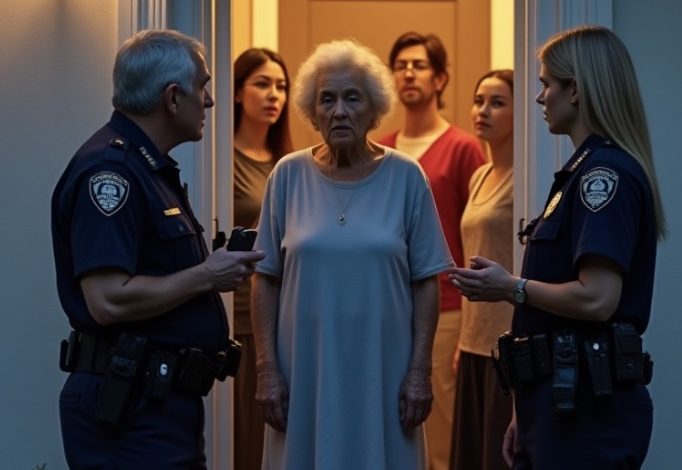“From Fresh Paint to Police Reports: Inside a Homeowner’s Calm Strategy Against a Family Property Grab”

I got home from work earlier than planned and walked into something I was never meant to see. The door to my master bedroom was wide open. The air stung with the smell of wet paint. A shaky aluminum ladder stood on my rug, and my sister-in-law, Sarah, was rolling a dull beige over the deep red walls I had carefully picked out and paid for.
“Mark! You’re early,” she sang, bright and cheerful, like nothing was wrong. “We’re getting a head start—renovating it before we move in!”
Before we move in.
My brother, Liam, leaned against the wall and nodded like this was normal. In the hallway, my parents—Richard and Helen—were smiling, almost laughing, as if the whole scene was a cute family surprise. They looked right past me, the person who owned the house and the room.
I did not yell. I did not ask what they thought they were doing. I just smiled—slow, tired, and calm. “Looks like you’ve got it handled,” I said evenly. “Don’t let me stop you.”
Then I turned around and walked downstairs.
People think shouting is strength. It isn’t. Shouting feeds the story the other side wants to tell—that you’re unstable, overreacting, unreasonable. Quiet can be stronger. Quiet lets you think. Quiet lets them get comfortable. Quiet buys you time.
I needed time.
The truth is, the warning signs had been there for months. It started with small things I brushed aside. Some of my mail was missing—bank letters, investment statements. When they turned up, the envelopes were opened and poorly resealed. Sarah shrugged and blamed the post office.
Then came the comments. “It’s such a big place for one person, Mark.” “This area is perfect for kids; it’s almost wasted with no little ones here.” Liam started bringing “friends” by—contractors, electricians—“just to get ideas.” He wasn’t getting ideas; he was getting estimates.
One night I went to the kitchen for water and saw a manila folder on the counter. I shouldn’t have looked. I did anyway. Inside were draft property transfer papers. My name listed as the person giving away the house. Liam and Sarah listed as the people receiving it. The story they had prepared was neat and simple: I was “relocating for work” and “gifting” them the property. Richard and Helen were typed in as witnesses. No signatures yet, but everything else was ready.
They weren’t repainting. They were rehearsing how my home would look once I was out of it.
That was the moment something in me hardened. Not anger—focus. I decided I would not make a scene. I would make a record.
That night I locked my office door and called Arthur Vance, a lawyer my firm keeps on retainer. He’s a silver-haired corporate litigator who smiles like a shark and hates bullies.
“Arthur,” I said, “I have a family problem. It looks like fraud and a plan to steal a house.”
He asked questions. I answered with facts. Missing mail. The folder. The painters in my bedroom. The contractors. He didn’t interrupt.
When I finished, he said, “They are not only trying to take your house. They are trying to push you out of your own life. We’ll respond with proof. No emotion—just documents and law. Gather everything tied to the property. Deed, mortgage satisfaction, tax bills, insurance, bank statements, photos—everything.”
For the next two weeks I lived like a guest in my own home. I went to work during the day. At night I became my own investigator. I scanned the deed and the mortgage payoff letter. I pulled ten years of property tax receipts. I printed every major repair invoice with my name and signature on it. I found the wire confirmation for the $50,000 loan I gave Liam two years ago when he said he had a “can’t-miss investment.” I pulled the promissory note he signed and never repaid.
With Arthur’s help, I checked my credit reports and store accounts. There it was: a new line of credit at a contractor supply store—opened in my name, with a forged signature. Charges totaled over $20,000 for kitchen and bathroom materials. Marble. Fixtures. Tile. They were upgrading my house with my credit so they could steal it “improved.”
Arthur had me take photographs: the fresh paint, new countertops, new faucets, the pallet of tile in the garage. “Courts like pictures,” he said.
The biggest piece came from pure carelessness. Sarah had been emailing progress photos to a friend. “Almost ours!” she wrote under a picture of my new counters. “A few more weeks and Mark will be out so we can finally live the life we deserve.” She accidentally copied an old work email address—one I helped her set up years ago and whose password she never changed. I logged in. The entire thread was there. I downloaded every message and image, put them in a secure folder, and sent them to Arthur.
Once the file was complete, Arthur moved fast. He submitted a formal report to the police economic crimes unit. He contacted my bank and got an immediate fraud alert placed on the forged accounts. He sent cease-and-desist letters to the contractors, warning them they were working under fraudulent authorization and might not be paid. He flagged my county’s recorder office so no deed could be filed without a call to his number first.
Then he said, “Invite them to dinner.”
I hesitated. “Dinner?”
“Yes. Keep them comfortable. We’ll be busy at the same time.”
So I called Richard and Helen. “Let’s have a family dinner Saturday,” I said warmly. “Bring Liam and Sarah. We’ll celebrate how nice everything looks.”
My mother sounded relieved. “Oh, Mark, that’s wonderful,” she said. “We’d love to.”
While they planned to celebrate, Arthur met with detectives and a judge. There was already enough evidence for search warrants at Liam and Sarah’s place. The plan was simple: Police would execute the warrants during our dinner. If they found what Arthur expected—draft deeds, forged applications, receipts—officers would stop by my house next.
Saturday came. They arrived dressed nicely, carrying a cheap bottle of wine like it was a housewarming gift. Sarah walked me through the kitchen, pointing at fixtures she had “chosen”—with my money. Richard said, “Liam has great taste,” and clapped him on the back. Helen laughed like we had all worked together on a fun project.
We sat to eat. I carved the roast chicken and asked about their week. They told stories. I smiled. We moved to pie. They relaxed.
Then came a knock at the door. Three firm raps.
“I’ll get it,” I said.
Two officers stood on the porch. “Mr. Mark Hayes?” one asked.
“That’s me.”
“We’re with the economic crimes unit. May we speak with you inside?”
I stepped aside. As they entered, the mood in the dining room dropped ten degrees. My parents’ faces fell. Liam stared. Sarah froze with her fork in the air.
They thought the police were there for me.
The older officer looked past me to the table. He read names in a steady voice: “Liam Hayes. Sarah Hayes. Richard Hayes. Helen Hayes.” He continued, “We are investigating conspiracy to commit fraud, forgery, and theft.”
Silence. Then a small sound—my mother’s breath catching.
“Why… why did the police come to us?” she whispered.
I sat at the head of my table and folded my hands. “Because you tried to write me out of my own life,” I said.
The officers explained the process. They had executed a warrant at Liam and Sarah’s apartment. They had found the draft deed, the forged credit applications, screenshots of emails and texts about “getting Mark out,” and receipts for a new car Sarah had partially paid for with cash skimmed from contractor invoices. They asked a few simple questions. No one answered well.
Sarah burst into tears. “We were only fixing it up,” she said. “We thought it would be better—”
“For you,” the officer said.
Liam tried a weak smile. “We’re family. This is all a misunderstanding.”
The officer didn’t smile back. “Stand up, sir.”
They cuffed Liam and Sarah first. Then they asked Richard and Helen to stand. My father stared at the table like a boy caught stealing change. My mother put a hand to her chest. No one looked at me.
They walked out past the rug and the counters and the beige Sarah had left behind, straight to the patrol cars. The door closed. The house was quiet again.
I didn’t cheer. I sat for a long time and listened to the clock. Justice doesn’t feel like fireworks. It feels like a storm ending—the air heavy, the room still, the mess obvious in the daylight.
Over the next weeks, the system moved. Arthur kept me informed. The police turned over the case to the prosecutor. Faced with emails, photos, forged forms, and the store account, Liam and Sarah accepted plea deals. They were convicted of felonies and ordered to pay restitution. Richard and Helen were listed as co-conspirators; they received probation and mandatory community service. In our small community, the story spread anyway. The shame was a sentence of its own.
Contractors returned what they could. The rest of the charges were reversed by the store once the fraud was proven. I repainted the bedroom myself. I could have hired someone, but I wanted the work in my hands. I rolled on a deep red again—not to forget what happened, but to claim the space. The color is a flag: I live here. I choose this.
People ask if I miss my family. I miss the idea of them. But ideas don’t pay back loans. Ideas don’t face a judge. Ideas don’t stop when they see your name on a deed and decide it should be theirs.
I still keep a copy of everything Arthur filed—deed, tax receipts, the letter that blocks any surprise filings at the recorder’s office, the fraud alerts. They sit in a binder on a shelf beside my desk. It’s not paranoia. It’s respect for what happened. Paper protects.
There are lessons I didn’t want but learned anyway:
Betrayal rarely starts big. It begins small and polite. A missing envelope. A “helpful” suggestion. A contractor “just looking.”
Silence is not weakness. Sometimes it is the smartest step while you gather proof.
Keep records. Emotion loses to documents every time.
Pick the right ally. A calm lawyer beats ten loud arguments. Arthur Vance didn’t raise his voice once. He didn’t have to.
Months later, my mother called. Her voice was thin. “We didn’t mean for it to go this far,” she said.
“It went exactly as far as you pushed it,” I answered. “And then the law pulled it back.”
I’m not angry every day. I’m busy. I go to work. I make coffee. I water the plants. I sleep in a room the color of a strong heartbeat and wake up to a house that is mine. On some Sundays I take a slow walk around the block and end on the front steps, the way I did the day I got the keys. I sit there and breathe.
People will tell you family is everything. Sometimes it is. Sometimes, family is the thing you survive. What matters is what you do next. I chose to keep what I built. I chose careful steps, not loud ones. And when someone asks me why the police came to them, I have a simple answer:
Because I stopped being quiet only when it counted most.
That’s the whole story. I came home early and found strangers painting my walls. They said they were “renovating before moving in.” They thought I’d shout and give them a story to point to. Instead, I gave them documents, officers at the door, and a judge. Now the walls are red again, the door locks work, and the house is peaceful.
I don’t believe in lucky breaks anymore. I believe in signs. An open highway brought me home a little sooner that day. That was a sign. The rest—proof, patience, and a plan—was my choice.










